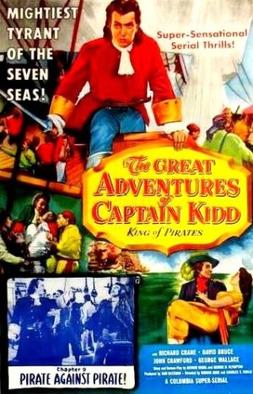Related Research Articles

William Kidd, also known as Captain William Kidd or simply Captain Kidd, was a Scottish privateer. Conflicting accounts exist regarding his early life, but he was likely born in Dundee and later settled in New York City. By 1690, Kidd had become a highly successful privateer, commissioned to protect English interests in North America and the West Indies.
Robert Culliford was a pirate from Cornwall who is best remembered for repeatedly checking the designs of Captain William Kidd.
Adventure Galley, also known as Adventure, was an English merchant ship captained by Scottish sea captain William Kidd. She was a type of hybrid ship that combined square rigged sails with oars to give her manoeuvrability in both windy and calm conditions. The vessel was launched at the end of 1695 and was acquired by Kidd the following year to serve in his privateering venture. Between April 1696 and April 1698, she travelled thousands of miles across the Atlantic and Indian Oceans in search of pirates but failed to find any until nearly the end of her travels. Instead, Kidd himself turned pirate in desperation at not having obtained any prizes. Adventure Galley succeeded in capturing two vessels off India and brought them back to Madagascar, but by the spring of 1698 the ship's hull had become so rotten and leaky that she was no longer seaworthy. She was stripped of anything movable and sunk off the north-eastern coast of Madagascar. Her remains have not yet been located.
Edward Coates was a colonial American privateer in English service during King William's War and later a pirate operating in the Red Sea and Indian Ocean.
Adam Baldridge was an English pirate and one of the early founders of the pirate settlements in Madagascar.
Dirk Chivers was a Dutch pirate active in the Red Sea and Indian Ocean.
The Pirate Round was a sailing route followed by certain, mainly English, pirates, during the late 17th century and early 18th century. The course led from the western Atlantic, parallel to the Cape Route around the southern tip of Africa, stopping at Madagascar, then on to targets such as the coast of Yemen and India. The Pirate Round was briefly used again during the early 1720s. Pirates who followed the route are sometimes referred to as Roundsmen. The Pirate Round was largely co-extensive with the routes of the East India Company ships, of Britain and other nations.
See also 1698 in piracy, 1700 in piracy, and Timeline of piracy.

The Great Adventures of Captain Kidd (1953) was the 52nd serial released by Columbia Pictures. It is based in the historical figure of Captain William Kidd.
Quedagh Merchant, also known as the Cara Merchant and the Adventure Prize, was an Armenian merchant vessel famously captured by Scottish privateer William Kidd on 30 January 1698.
John Ireland was a pirate active in the Indian Ocean. He is best known for sailing with Thomas Tew.
Robert Glover was an Irish-American pirate active in the Red Sea and Indian Ocean area in the late 1690s.
William Mayes was a pirate active in the Indian Ocean. He was best known for taking over William Kidd’s ship Blessed William and sailing with Henry Avery. William Mayes is american, specifically from Rhode Island. Mayes was one of the original founders of Libertalia. A civil war came about and William was poisoned by Henry Avery and Thomas Tew.
George Raynor (1665–1743) was a pirate and privateer active in the Red Sea. As a pirate he captained the Batchelor’s Delight .
Ralph Stout was a pirate active in the Indian Ocean. He is best known for rescuing fellow pirate Robert Culliford after each of them spent separate 4-year periods in Mughal Empire prisons.
Joseph Wheeler was a pirate active in the Indian Ocean and Red Sea. He is best known for sailing alongside Dirk Chivers and Robert Culliford.
John Swann was a minor pirate in the Indian Ocean, known almost entirely for speculation about his relationship with Robert Culliford.
Tempest Rogers was a pirate trader active in the Caribbean and off Madagascar. He is best known for his association with William Kidd.

Acts of grace, in the context of piracy, were state proclamations offering pardons for acts of piracy. General pardons for piracy were offered on numerous occasions and by multiple states, for instance by the Kingdom of England and its successor, the Kingdom of Great Britain, in the 17th and 18th centuries.
Edward Welch was best known for leading a pirate settlement and trading post at Madagascar.
References
- ↑ "William III, 1698-9: An Act for the more effectuall Suppressions of Piracy. [Chapter VII. Rot. Parl. 11 Gul. III. p. 2. n. 5.] | British History Online". www.british-history.ac.uk. Retrieved 2022-06-28.
- 1 2 Ritchie, Robert C. (2006). Captain Kidd and the war against the pirates. Barnes & Noble Books. ISBN 0-7607-0840-1. OCLC 654787108.
- ↑ "Robert Culliford". goldenageofpiracy.org. Retrieved 2022-06-28.
- ↑ Kester-McCabe, Dana. "Legends of Eastern Shore Pirates". Delvmarva Almanac – Moonlight Productions. Retrieved June 29, 2022.
- ↑ Mervine, William M. Pirates and Privateers in the Delaware Bay and River.
- ↑ Fortescue, J.W., ed. (1905). Calendar of State Papers, Colonial Series, America and West Indies, 27 October 1697 – 31 December 1698. London: Lords Commissioners of His Majesty's Treasury. Retrieved 29 June 2022.
- ↑ Marley, David (2010). Pirates of the Americas. ISBN 9781598842012.